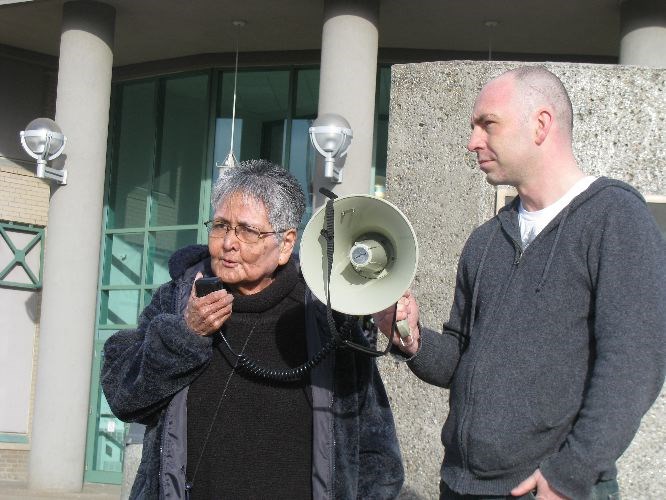Racism is alive and well, in Canadian culture and in Prince George, according to minorities who see it in their daily lives. It can only be defeated by a demanding public, they said; an apathetic public would lose the struggle for equality.
"I have lived with racism every day of my life...it has been normalized for me," said Lheidli T'enneh elder Violet Bozoki, the first speaker at an anti-racism rally held on the front steps of the Prince George Courthouse Monday afternoon. "My blood flows red just like yours, not brown or black."
Vice-tribal chief Terry Teegee of the Carrier Sekani Tribal Council said the violence and risk experienced by aboriginal people, especially women like his cousin Ramona Wilson (one of the Highway of Tears victims) was an end product of racist public policy and racist social acceptance that still goes on in today's society.
"Racism still exists and we need to do something about it," he said. "Race, colour, religion, sexual orientation...we have to tolerate that as human beings or we won't be a healthy society. Do we want that for our children? We have to own it."
Not someone who has experienced racial discrimination, white, middle-class school board trustee Valentine Crawford said his being a gay man had forced him into head-on confrontation with prejudice. Intolerance applies to subculture as well as race, he said when it was his turn to speak.
"It's about us being a people together," he said. "There are so many lines that differentiate us that we sometimes forget what keeps us together as a community and more than that, as a family. Events like this one mean a lot to those who don't necessarily have a voice."
The featured speaker at the event, which was organized to coincide with the United Nations Day for the Elimination of Racial Discrimination, was someone who used to work for the U.N. in international prisons for war criminals. Lucky Powar saw the worst effects of racial intolerance in theatres like Sierra Leone and Kosovo.
He saw the fresh effects of "Operation Kill Every Living Thing" which was a slogan used to terrifying literal effect by one of the warring factions in Sierra Leone, and he saw the horrific aftermath of "ethnic cleansing" in the former Yugoslavia.
"I saw nothing but death. Bodies everywhere you looked: women, children, animals," he said of his African experience and "Kosovo was a slaughterhouse; you could smell it when you went outside," he said of his European experience.
In all these places, it was racial division not political or nationalist economic motives that drove the crimes against humanity, Powar said.
"I think what you are doing here today is awesome," he told the crowd of about 80 people. "People forcing their will on others is wrong, and you have my full support in your efforts to stop it."
The organizers were two unlikely associates. UNBC student Daniel Gallant and Jay from the Third Ave. Collective saw that no one was celebrating the U.N. commemorative day, and simply insisted between themselves that a gathering should happen. It was an emotional conclusion when those gathered marched the streets of downtown from the courthouse to the Civic Centre where more anti-racism efforts were promised for the near future.



